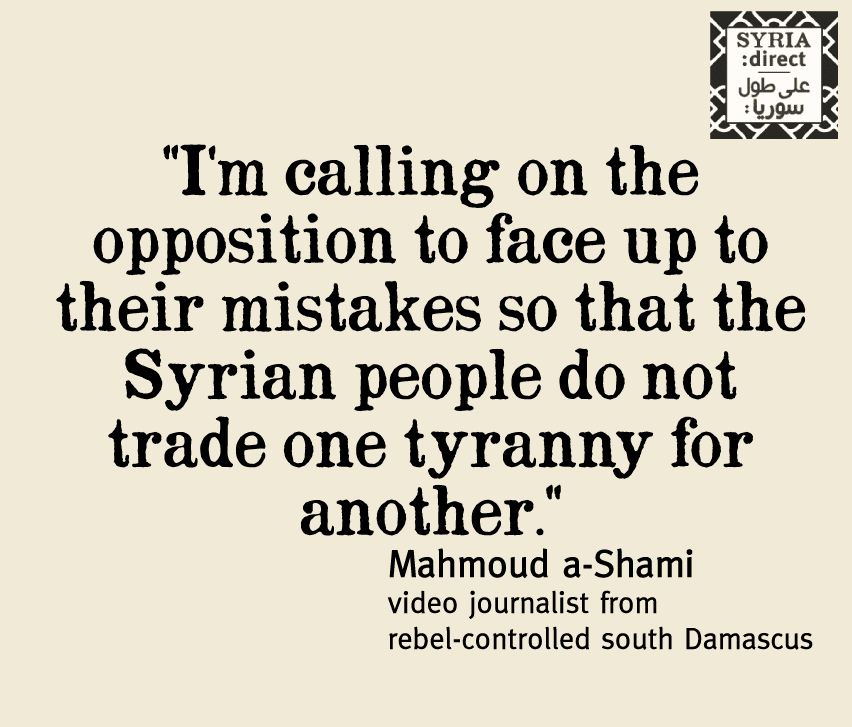South Damascus journalist tortured in FSA-affiliated prison: “I’m calling on the opposition to face up to their mistakes”
“Unfortunately, even in liberated areas citizen journalists are not safe […]
25 January 2016
“Unfortunately, even in liberated areas citizen journalists are not safe from arbitrary arrest.”
Mahmoud a-Shami, a video journalist from rebel-controlled south Damascus, posted the above quote to his personal Facebook page in early December, commenting on a series of violations committed by opposition factions against local journalists.
At the time, a-Shami, who has previously reported to Syria Direct on FSA defections in south Damascus and whose videography has been featured on Al Jazeera, had no idea that less than two weeks later, he would himself be arrested, tortured and forced to sign a false confession by an FSA-affiliated brigade.
In the following interview with Syria Direct’s Ammar Hammou, a-Shami recounts how he was detained in a “dark cellar” for more than a month by members of the Ababil Houran Brigade in the south Damascus town of Beit Sahm.
“First they accused me of “espionage and treason,” saying that I was working for the regime… later the accusation changed to pledging allegiance to the Islamic State,” says a-Shami.
Throughout his detainment, a-Shami was “severely” tortured using a technique called “a-shabah” [the ghost], in which the detainee is suspended off the ground for hours at a time.
“I had only heard of this type of torture from people who had spent time in Assad’s prisons,” says a-Shami.
After enduring a month of detainment and torture, a-Shami was released two weeks ago through a prisoner exchange agreement.
“I am telling this story to send a message to the opposition calling on them to face up to their mistakes so that the Syrian people do not trade one tyranny for another.”
Q: What was the reason for your recent disappearance?
I was arrested by members of the Ababil Houran Brigade while passing one of their command posts in the South Damascus village of Beit Sahm. They held me at the command post without telling me the reason for my arrest.
Q: What was the accusation directed against you?
First they accused me of “espionage and treason,” saying that I was working for the regime. The accusation was based on a video report I published with Al Jazeera several months prior, which discussed the Free Syrian Army’s resistance to repeated attacks by pro-regime Shiite militias.
At that time, Shiite militias were heavily mortaring the south Damascus front. Later the accusation changed to “pledging allegiance to the Islamic State.”
Q: Can you recount some of what you underwent during your detainment?
When I was arrested they placed me, blindfolded and shoeless, in a vehicle. The men beat me and cursed at me the whole time I was in the vehicle until we reached the prison, where they placed me in a dark cellar.
That first night I couldn’t sleep at all, partly because of fear and partly because of the cold.
The next day, masked men came and blindfolded me again and tied my hands behind my back. At this point they attached me to something they call the “mashbaha” and lifted me up so that my feet were no longer touching the ground.
I had only heard of this type of torture from people who had spent time in Assad’s prisons. While I was in that position, suspended in the air, the interrogator beat me with a whip.
I was tortured and beaten throughout the interrogation regarding the video report I published with Al Jazeera. They asked me who I sent the report to and I told them I was an independent video journalist and had sent it to Al Jazeera. But they didn’t believe me.
Later they changed the accusation to “pledging allegiance to the Islamic State” and moved me to a holding cell for people accused of being Islamic State sympathizers. At this point they started another interrogation into my affiliation to the Islamic State. When I denied any affiliation to the group, they tortured me severely. When I couldn’t bear the torture any longer I confessed to pledging allegiance to the Islamic State and they took me and photographed my written confession.
Later the warden came to my cell and told me to gather my belongings because I was being released as part of a prisoner exchange with civilians from Islamic State controlled territory.
Q: Has this event changed your position toward the revolution and opposition fighters?
I’m not recounting this story as an insult to the revolution and those fighting the regime. I am telling this story to send a message to the opposition, calling on them to face up to their mistakes so that the Syrian people do not trade one tyranny for another.







